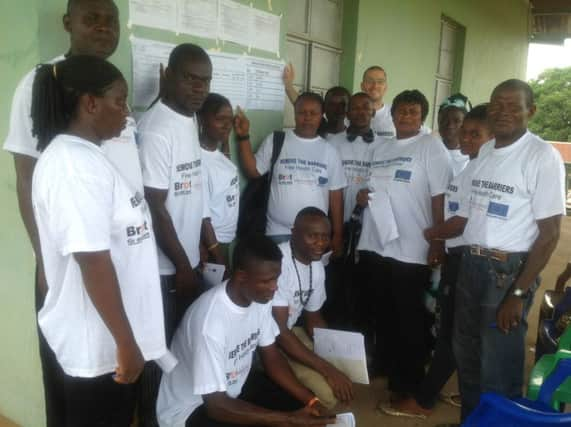British Ebola victim ‘sitting up and talking’


William Pooley, 29, the country’s first confirmed Ebola sufferer, is being treated at the Royal Free Hospital in north London.
ZMapp is extremely rare and, as it is unlicensed, is only produced in minute quantities.
Advertisement
Hide AdAdvertisement
Hide AdIt has been credited with the recoveries of American Ebola sufferers Dr Kent Brantly and missionary Nancy Writebol, but a Spanish priest and a Liberian hospital director both died despite being treated with ZMapp.
Dr Michael Jacobs, consultant and clinical lead in infectious diseases at the Royal Free Hospital, said yesterday: “We have had the opportunity to give him the ZMapp treatment. It is an experimental medicine; we made that absolutely clear in our discussions with him.”
He added: “What has become apparent to us is that he is clearly a rather resilient and remarkable young man.”
The hospital said Mr Pooley was “sitting up and talking to the nurses and doctors who are looking after him”.
Mr Pooley was given the first dose of ZMapp on Monday and further doses are expected to be administered “in due course”.
Dr Jacobs added: “We are giving him the very best care possible. However, the next few days will be crucial. The disease has a variable course and we will know much more in a week’s time. Will is in a stable position and we are very pleased with where he is. We couldn’t hope for more.”
Mr Pooley, from Eyke, Suffolk, had worked as a volunteer providing palliative care to HIV and cancer patients at The Shepherd’s Hospice in Sierra Leone from March until July.
He asked to be relocated to the Kenema Government Hospital to serve on an Ebola treatment ward after he heard reports that patients were being abandoned when health workers died from the virus.
Advertisement
Hide AdAdvertisement
Hide AdSome strains, such as the one behind the Congo outbreak in 2003, have killed 90 per cent of those affected. The current outbreak has killed 55 per cent.
The round-the-clock care Mr Pooley is receiving will radically improve his chances, but experts said his treatment could take weeks, if not longer, and there is no guarantee he will survive.
Manufacturers of ZMapp said their stocks have been exhausted because of high demand.
Meanwhile, a leading Scottish immunologist has warned that health workers in Africa need more suitable protective clothing to prevent the disease from spreading.
Dr Sheena Cruickshank said: “We have fantastic volunteers going out to disaster areas. But the problem we have is the country may not have access to the protective equipment needed.”
She said one of the key reasons the disease is spreading is a distrust of doctors by many who need medical care.
Dr Cruickshank, who works at the University of Manchester, said: “One of the major challenges will be persuading people [in Africa] that they need to seek medical care. People are very frightened and distrustful of doctors and outsiders. They see Ebola as a death sentence.
“But that is one of the areas the World Health Organisation (WHO) is making great strides with. They are trying to convince village leaders to accept health workers into their areas.”